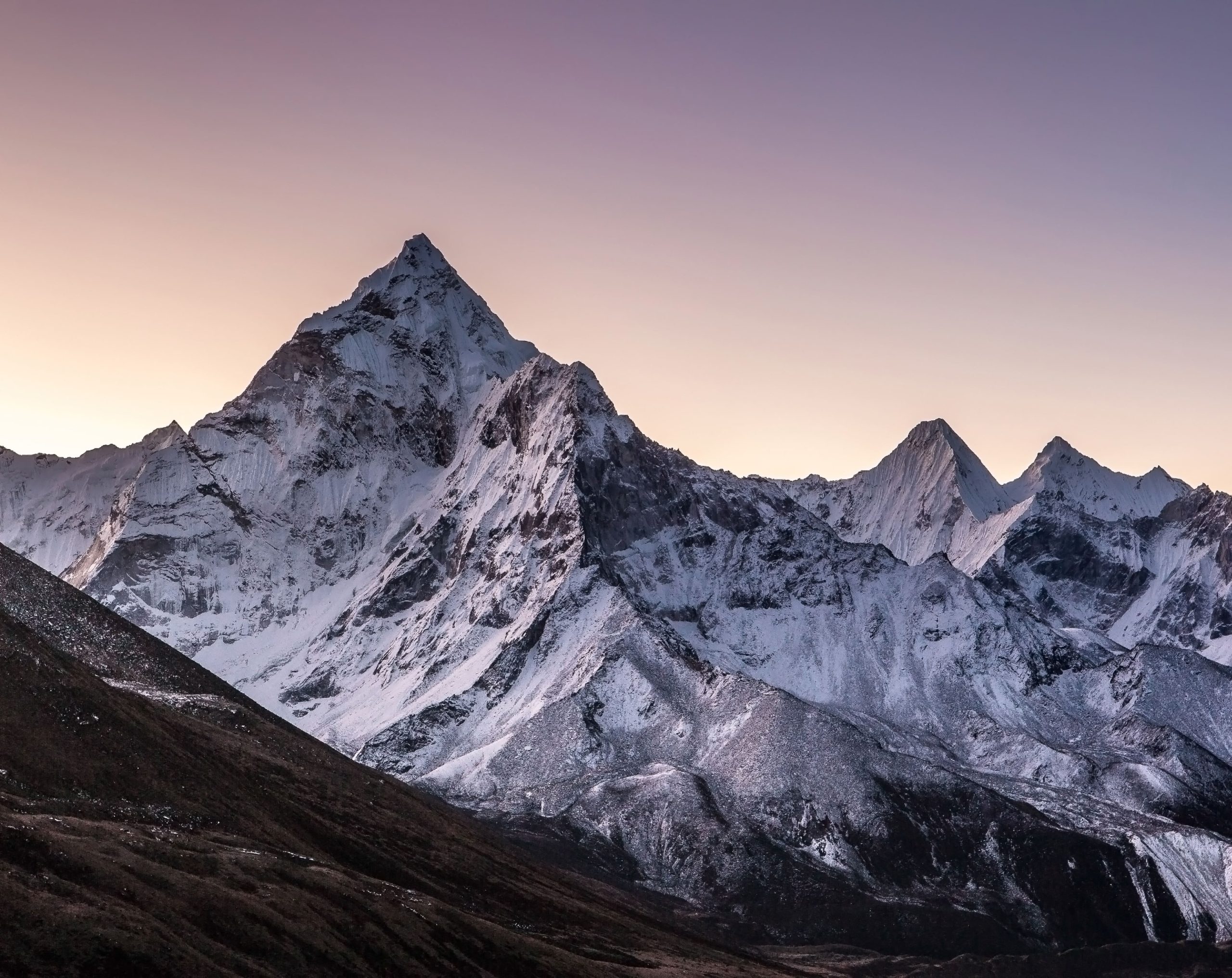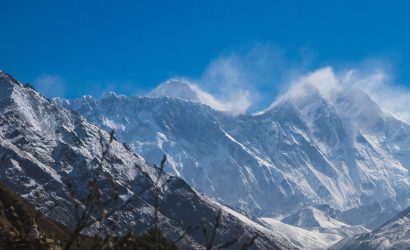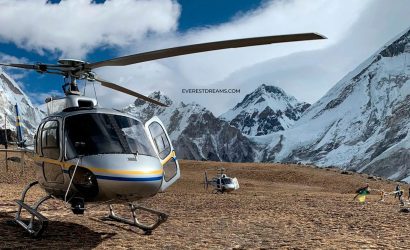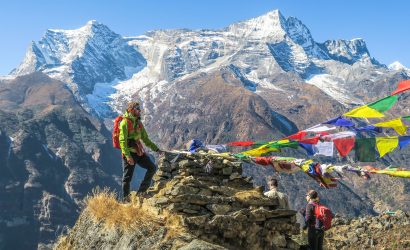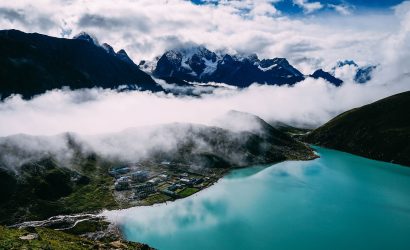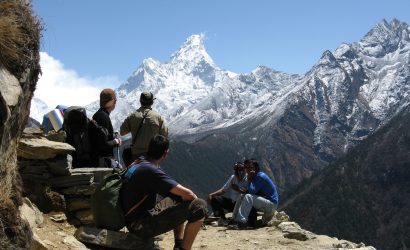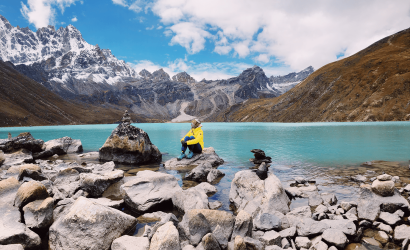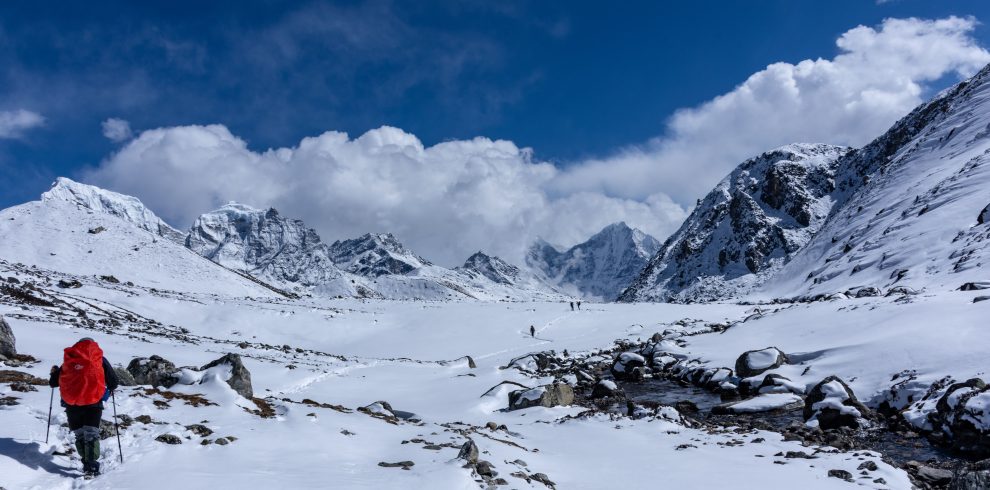-
Bus, Airlines
-
3 Stars Accommodation in City & Guest House During Trek
-
5644 metres
-
Kathmandu
-
Feb, Mar, Apr & May
-
Trekking
-
All meals during the trek
-
English, Spanish, French, Chinese
-
Easy to Moderate
-
2-15
-
12
-
65
Overview
The Everest Base Camp Leisurely Trek is a 16-day journey through classic trails, offering breathtaking landscapes and cultural experiences. From Lukla, visit Phakding, Namche Bazar, Tengboche, Dingboche, and Gorak Shep. Highlights include stunning views of Mount Everest, ancient monasteries, and reaching Everest Base Camp. Suitable for moderate fitness levels.
Highlights
- Breathtaking panoramas of the world's highest mountains and unique Sherpa culture
- Classic trail used by renowned climbers, including Sir Edmund Hillary and Tenzing Norgay Sherpa
- Sherpa settlements: Lukla, Phakding, Namche Bazar, Tengboche, Dingboche
- Stunning views of holy peaks like Kumbila and Kusum Kanguru along Dudh Koshi Valley
- Visit to Namche Bazar and entrance to Sagarmatha National Park
- Ancient monastery, Riwa Gompa, in Pangboche
- High Himalayan grazing lands and pristine blue Chola Lakes
- Everest Base Camp at 5,364 meters with glacial landscapes
- Iconic Kala Patthar viewpoint at 5,545 meters for panoramic views
- Encounter with ancient monasteries, chortens, and indigenous mountain people
- Designed for beginners in high altitudes with moderate fitness requirements
Itinerary
Cost
Cost Includes
- All airport/hotel pick up and drop in private car/van
- 3 Nights accommodation in Kathmandu including breakfast, Twin sharing 3*
- 12 Nights stay in Lodge/Guest House during the trek.
- An experienced English-speaking Trekking Guide and a Porter during the trek.
- Salary, food, insurance, and lodging cost for guide and porter ( 2 Trekkers-1 Porter )
- During the Trek, we will have Breakfast, Lunch, Dinner, and Tea/Coffee each time only.
- Welcome and Farewell Meals and Breakfasts while in Kathmandu.
- National Park Permit and TIMS for Everest.
- Airfare from Kathmandu to Lukla and return flight to Kathmandu and domestic flight departure taxes.
- Down Jacket and Sleeping Bag that needs to be returned to the office after trek completion.
- Everest Dreams Kitbag and T- shirt for you
- Kathmandu Valley city tour with guide, Including entrance fees.
- Ncell Sim Card (Nepalese Sim Card including 20 GB data pack) - Only 1 for a group.
Cost Excludes
- Nepal entry visa fees.
- International airfare and departure tax.
- Bar bills, laundry, and other expenses of personal nature.
- Travel insurance including evacuation.
- Lunch and dinner in Kathmandu except welcome and farewell.
- Tips for local staff, guides, and porters.
- Desserts, Hot Shower, Hot Water, Wi-Fi, Mineral Water.
FAQs
Begin your adventure by taking a thrilling mountain flight from Kathmandu domestic airport to Lukla, a mountain settlement and the starting point of your trek. From Lukla, make your way to upper Phakding, following the Dudh Koshi Valley and ascending to the Sherpa capital of Namche. As you trek along a high traversing path, you’ll be rewarded with your first impressive views of Mount Everest. Continue your journey towards Tengboche Monastery, an ancient monastery nestled at 3867 meters, offering panoramic views of the Everest landscape.
Descend to the Imja Khola and proceed to the villages of Pangboche and Pheriche, eventually reaching the moraine of the Khumbu Glacier. Follow the glacier to reach Lobuche, and the next day, embark on an uphill climb to Gorakshep and onward to Everest Base Camp. Marvel at the awe-inspiring sights of snowy mountains, lakes, and glaciers before returning to Gorakshep.
Make your way to the grassy ridge of Gorakshep and continue towards the iconic vantage point of Kala Patthar, standing at an impressive elevation of 5545 meters. Take caution and rest frequently as you traverse this challenging terrain. Once you reach the summit, you’ll be greeted by breathtaking views of endless mountain ranges and high-altitude landscapes.
Retrace your steps back to Pheriche, then continue to Namche Bazaar, following the Dudh Koshi River until you reach Lukla. Board a flight from Lukla to Kathmandu, soaring above the majestic peaks of the world’s highest mountains. Join Everest Dreams Nepal Team at The Alpine Club of the Himalayas and embark on this thrilling trek.
Please note that this trek is particularly strenuous, and the itinerary does not include dedicated acclimatization days. It is designed for individuals with good physical and mental fitness, some trekking experience, and a limited time frame.
The Everest Region Trek is renowned for its wide range of facilities, offering options from basic to luxury accommodations.
During your trek, you will have the opportunity to indulge in a variety of cuisines. From Nepali, Tibetan, Indian, to Western and continental meals, the region offers a diverse culinary experience. Whether you choose to dine in small tea houses or luxurious hotels, you can find options that suit your budget. Don’t miss the chance to savor traditional dishes and popular snacks that are famous in the region.
When it comes to drinking water, natural water sources are available along the trail. However, it is important to note that the water is untreated, so it is not advisable to drink it directly. Instead, you can refill your bottles with boiled water or use cold-filtered water provided by the teahouses. For added safety, you may consider carrying water purification tablets, chlorine drops, or utilizing SODIS (sunlight-assisted) filtration methods. This not only provides extra assurance but also helps save money and reduce plastic waste.
Throughout the Everest Region trek, you will find a range of accommodations including trekking lodges, teahouses, and even hotels to cater to your preferences and budget. These accommodations offer a variety of options, from basic and well-maintained lodges to reasonably luxurious 5-star establishments with additional amenities.
Teahouses along the trail vary in quality and price, offering different levels of comfort and services. The rooms in teahouses are typically shared, with beds, pillows, sheets, and extra blankets provided due to the cold temperatures at night. Additionally, most teahouses offer hot shower facilities for trekkers to freshen up after a long day of hiking.
For those who prefer camping, there are designated campsites available along the trekking route. This option allows trekkers to enjoy a more immersive outdoor experience surrounded by the natural beauty of the Everest region.
The ideal time for trekking in the Everest region is during the autumn (September, October, and November) and spring (March, April, and May) seasons.
Autumn offers clear weather, warm temperatures, and excellent visibility, making it easy to navigate the region. The mild climate during this time creates favorable conditions for trekking.
Spring is another great season to visit the Everest region as it marks the end of winter. During this time, the landscape comes alive with vibrant colors as rhododendrons, moss, and orchids bloom across the trails. The clear blue skies provide a stunning backdrop to the snow-capped peaks.
It is generally recommended to avoid trekking during the monsoon season (June to August) due to harsh weather conditions, frequent landslides, and floods that can make travel difficult and unsafe.
Winter (December to February) brings heavy snowfall to the area, covering the trails and making it inaccessible for trekking. Therefore, winter is not considered an ideal time for trekking in the Everest region.
Free Cancellation, Everest Base Camp Trek Cost
If you cancel your Everest Base Camp Trek up to 7 days before departure you forfeit your deposit only.
If you cancel your tour within 7 days from the start of your experience you forfeit 100% of your tour cost.
You can reschedule the starting time of your experience up to 15 days prior to the original starting time for free. If you want to reschedule your starting time within 15 days prior to departure extra fees might apply.
No refunds are made if you voluntarily leave a trip for any reason after the trip starts.
No refunds will be made for accommodation, transport, sightseeing, meals, or any services not used.

